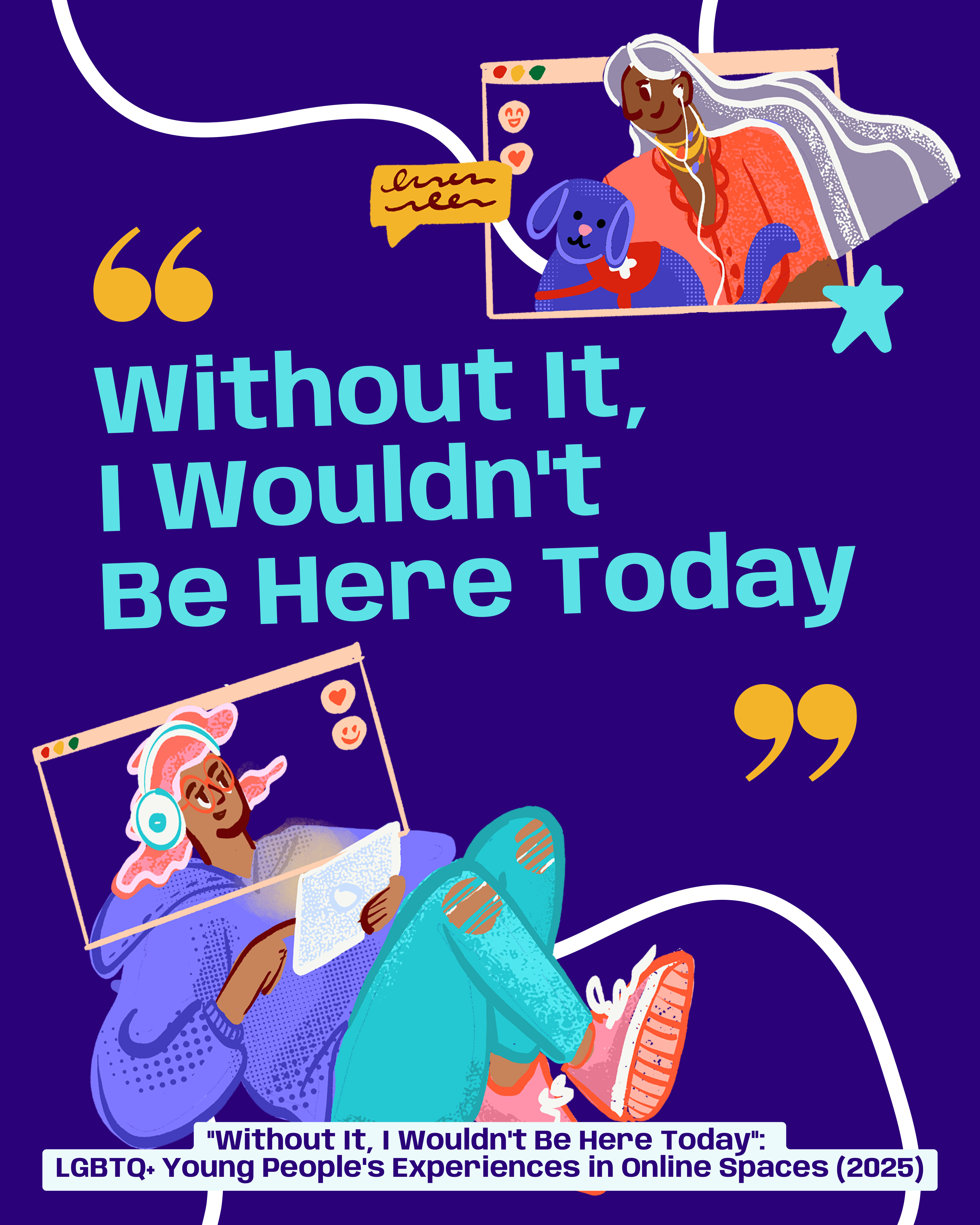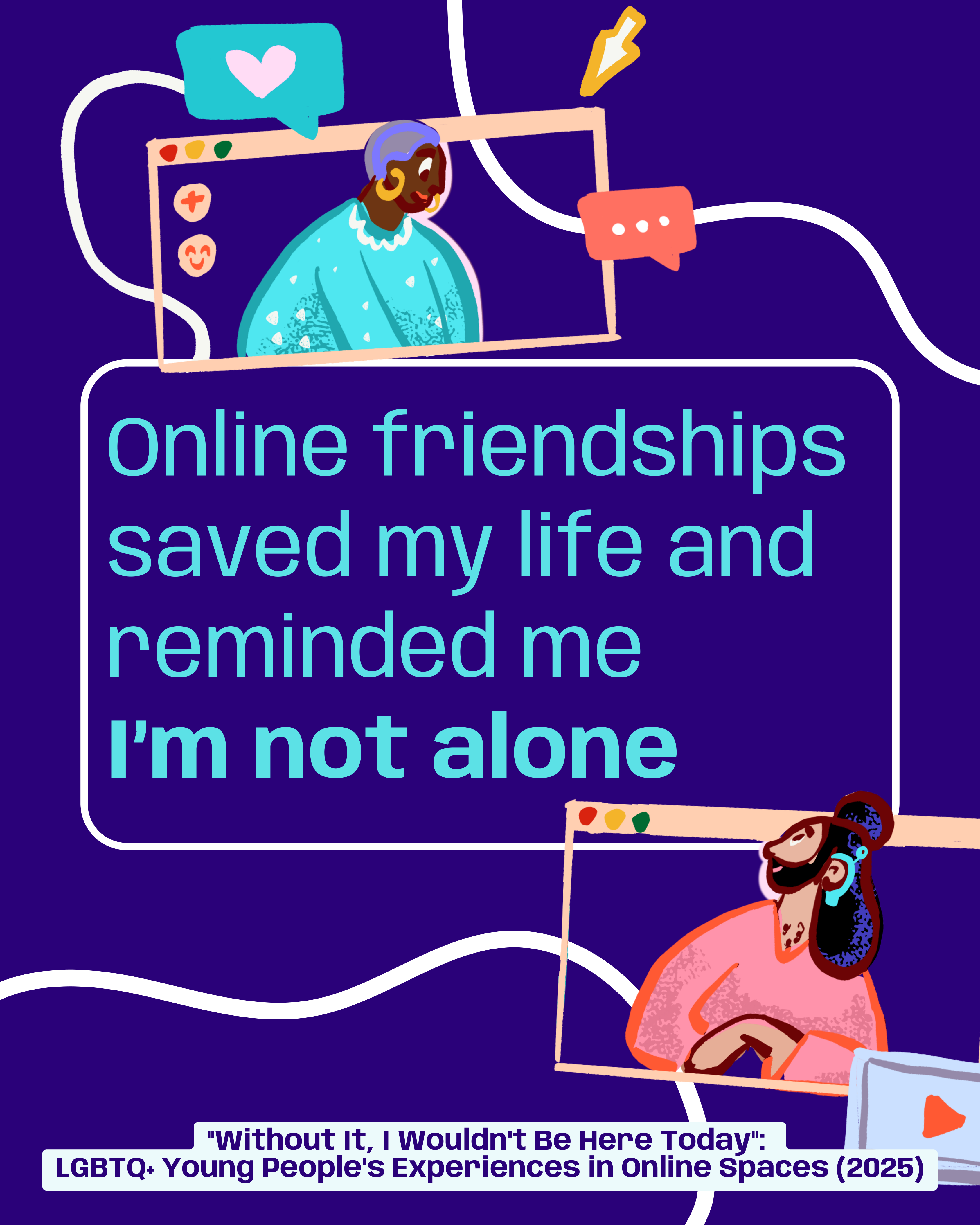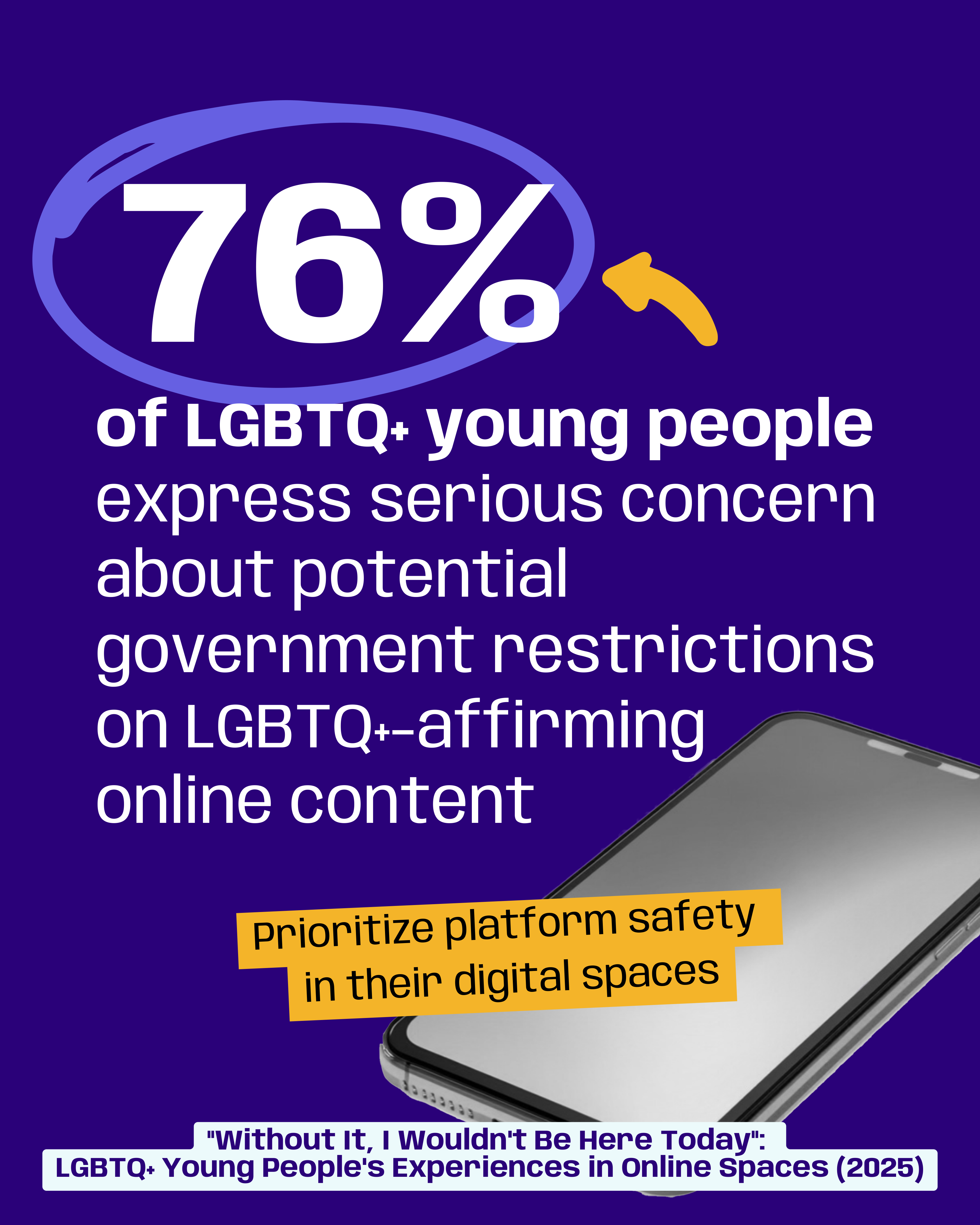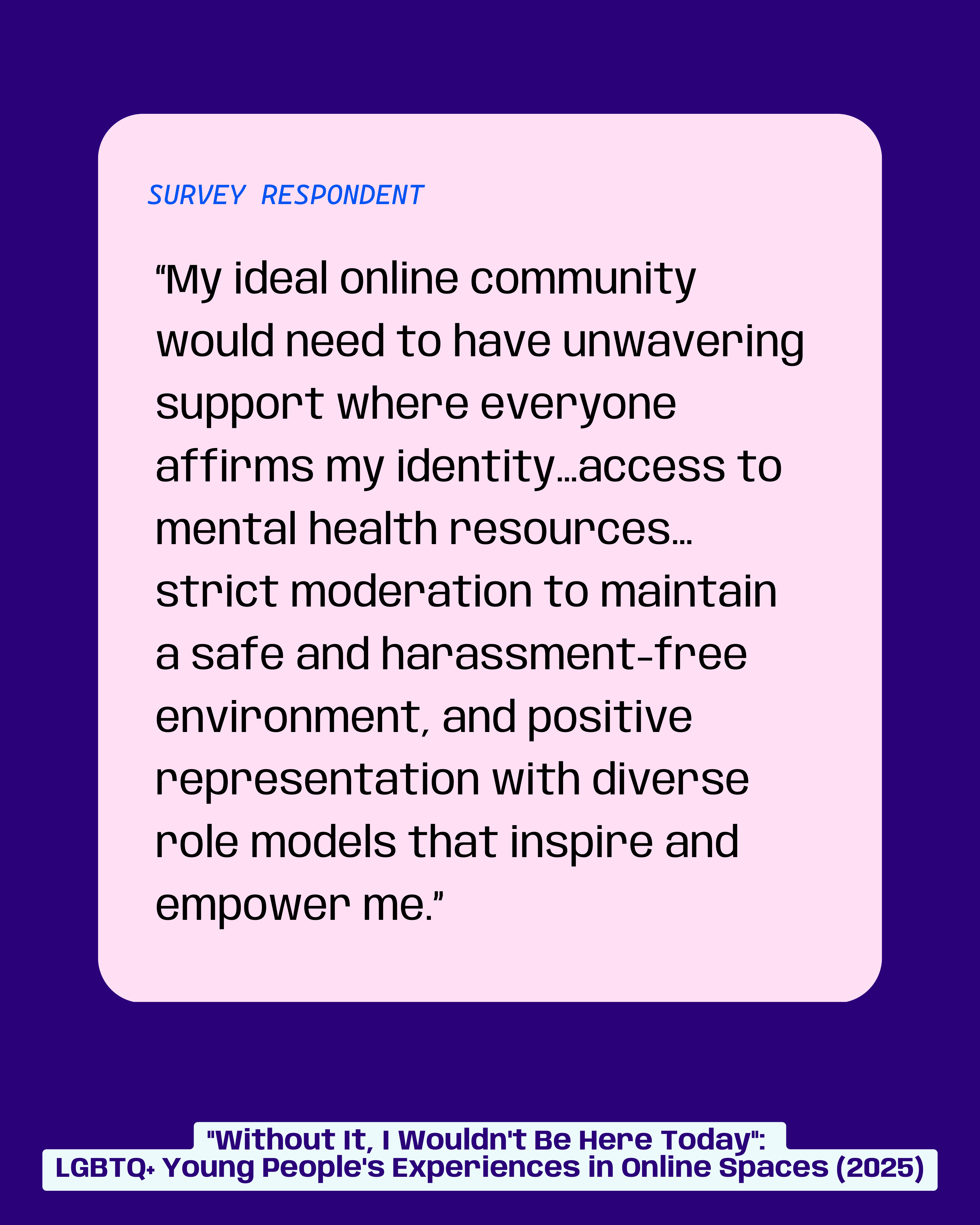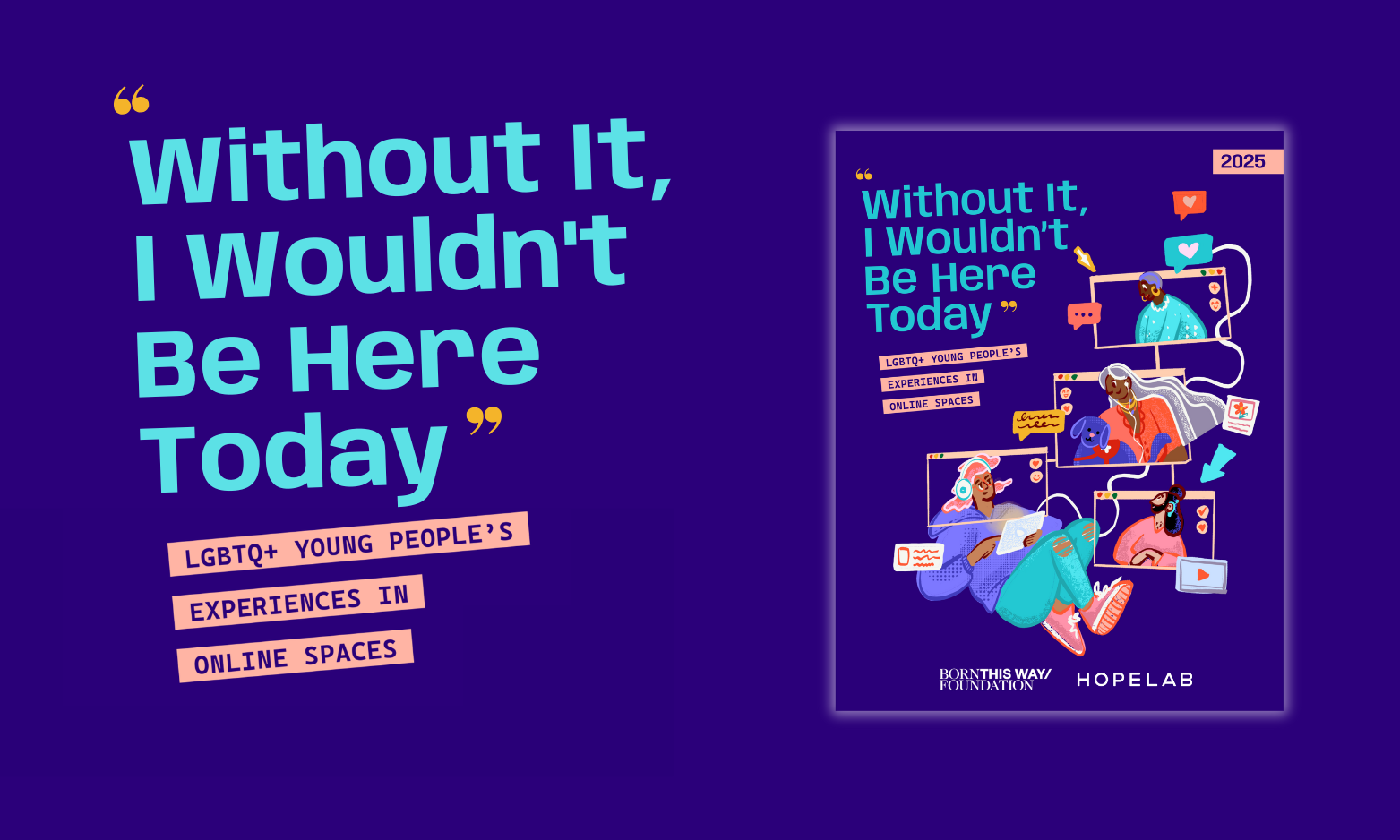Young people, especially those who identify as LGBTQ+, have unique needs and experiences when it comes to their mental health. From broader existing research, we know that LGBTQ+ young people face greater challenges with mental health and wellbeing than their heterosexual and cisgender peers – due to their experiences of rejection, discrimination, and victimization. For them, online spaces serve as a place to explore different identities, find affirmation and support, and gain access and connection to peers.
In 2024, Born This Way Foundation and Hopelab partnered to survey over 1200 LGBTQ+ young people about their online experiences. Our objectives in this work were to:
- Better understand the unique needs of LGBTQ+ young people, including intersectional factors among subgroups
- Uplift the voices and perspectives of LGBTQ+ young people
- Inform actions and policies that serve LGBTQ+ young people with their input at every stage
We conduct youth-engaged research where young people are a part of our process at every stage of design, development, and execution. With this specific report, LGBTQ+ young people co-created the survey instrument with our research teams, completed the survey, and then interpreted the findings with us to ensure our report was relevant, relatable, and actionable.
Strategy + Execution
- Instrument Development: The survey instrument was co-created with LGBTQ+ young people to reflect their voices and experiences.
- Procedure: Survey recruitment of LGBTQ+ young people aged 15 to 24 in the United States was conducted via targeted ads on social media. Survey data was collected between August and September 2024. Quota-based sampling was used to ensure that there was diverse representation across key demographics, including age, gender identity, and race/ethnicity.
- Data Analyses: Following quantitative data analysis, the research teams conducted co-distillation interviews and focus groups with 20 LGBTQ+ young people aged 15 to 24 to contextualize and prioritize the findings. Our teams intentionally sought input from trans and BIPOC young people to ensure they were represented. Information and select quotes were incorporated throughout the report.
Unique Contributions + Addressing Challenges
- Translating Our Findings Into Action: Turning research into real-world impact is challenging, but we are committed to making it actionable. To achieve this, we partnered with Dr. Alvin Tran, a Harvard- and Yale-trained scientist, and CenterLink to conduct nationwide focus groups with LGBTQ+ young people. Participants reviewed our research findings and provided specific recommendations for healthcare workers, families, tech and social media companies, and active allies on how to support LGBTQ+ young people online and in person.
- Diving Deeper:
- Our project was developed in partnership with LGBTQ+ young people, with a focus on the unique needs of subgroups within the community. After completing our initial report, we recognized the need to highlight specific communities more explicitly. We explored regional differences through our brief report, Exploring Pride and Support of LGBTQ+ Young People in Rural Communities, and we will release our final research brief with Hopelab, focusing on the experiences of trans young people, during Suicide Prevention Month. These efforts underscore our commitment to exploring intersectional factors and conducting youth-engaged research that produces real-world impact.
- Recognizing that LGBTQ+ research and data are currently limited due to funding constraints, we partnered with academics who have expertise working closely with specific subgroups and who will have access to our dataset. They will be able to further explore the nuances among the Black and Indigenous LGBTQ+ youth communities.
Applied research doesn’t exist solely in a lab, it lives in human and social interactions. By working directly with young people, our research report reflected the authentic experiences of LGBTQ+ young people and centered their needs. Their perspectives provided us with key insights on subgroups within the LGBTQ+ community, specifically trans young people and LGBTQ+ young people in rural areas.
We learned that LGBTQ+ young people want stronger, safer connections through: 1) the support of their families; 2) enhanced safety measures online; and 3) action-oriented allyship.
To bring these learnings to life and to uplift the voices of LGBTQ+ young people, we hosted a 75-person convening with young people and adult experts to foster meaningful discussion on actionable next steps. Takeaways from this convening led to the development of three resource guides for key audiences to take action and support LGBTQ+ young people:
- Support LGBTQ+ Young People: A Guide for Families to Listen, Learn, and Act
- Online Safety for LGBTQ+ Young People: Resources to Enhance Technology and Platform Responsibilities
- Advocate for LGBTQ+ Young People: How to Be an Active Ally (To be released in October)
Beyond the resource guides, our team supports local grassroots organizations to create safe in-person spaces for LGBTQ+ young people around the world with our Kindness in Community Fund. We will continue translating our research into impact through educational webinars, interactive workshops, and cross-sector partnerships that turn our findings into action.
Video for “Without It, I Wouldn't Be Here Today”: LGBTQ+ Young People’s Experiences in Online Spaces
